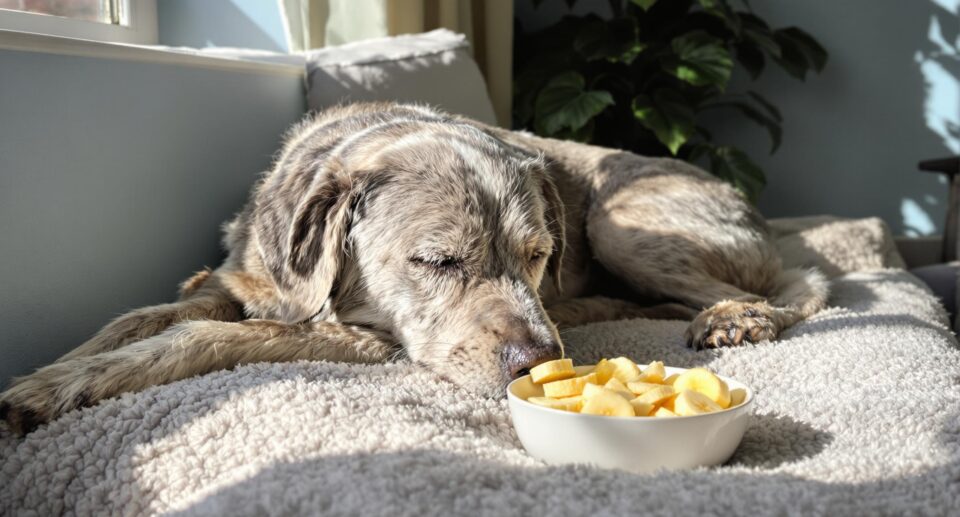Can Dogs Eat Bananas? A Guide for Pet Parents

Key takeaways
- Bananas are a safe treat for dogs and offer beneficial nutrients like potassium and vitamin C.
- Introduce bananas slowly and observe your dog’s reaction to avoid digestive issues, especially for dogs with existing health conditions.
- While bananas offer benefits, they should complement a balanced diet and not replace regular meals. Consult your veterinarian for personalized dietary advice.
Sharing snacks is one of the ways we connect with our pets, and bananas, in particular, often spark curiosity with our furry friends. But are they safe for dogs? And how much is too much? PetHealthMD helps you explore the best nutrition choices for your dog, including which fruits make healthy, safe treats. Bananas are one of the better options, but like anything, they should be offered with a bit of knowledge and care.
Are Bananas Safe for Dogs?
Yes, dogs can safely enjoy bananas in moderation. They’re non-toxic, easy to prepare, and packed with nutrients that support overall wellness. Still, just because bananas are good doesn’t mean more is better.
Bananas contain natural sugars and carbohydrates, which are fine in small amounts but can lead to weight gain, digestive upset, or blood sugar spikes if overfed, especially in dogs with health conditions like diabetes or obesity. That’s why moderation matters.
The ideal serving sizes vary by size:
- Small dogs: Just a few slices once or twice a week
- Medium dogs: 1/4 to 1/3 of a banana, no more than twice a week
- Large dogs: Up to 1/2 a banana once or twice a week
Think of bananas not as part of your dog’s regular diet, but as a special treat.
The Health Benefits of Bananas for Dogs
Bananas offer a wide range of nutrients that support your dog’s health in natural ways. Here’s what you’ll find in this powerhouse fruit:
- Potassium: Supports muscle function and heart rhythm
- Vitamin C: Boosts immune health
- Vitamin B6: Helps with brain development and hormone regulation
- Magnesium: Aids nutrient absorption and supports bone strength
- Manganese: Helps with metabolism
- Fiber: Promotes healthy digestion
Bananas are also low in cholesterol and sodium, making them a great alternative to processed dog treats. The complex carbohydrates found in bananas are beneficial for active dogs.
How to Serve Bananas to Your Dog
Bananas are easy to prepare and fun to serve. Make sure they’re peeled and cut into dog safe portions. Try these serving ideas:
- Sliced as treats
- Mashed into your dog’s food
- Frozen banana slices
- Mixed with plain yogurt or xylitol free peanut butter
- Baked into dog safe homemade treats
For additional nutrition support, browse the Dog Supplements category on 1800PetMeds.
Why Bananas Should Stay an Occasional Treat
Treats should only make up 10 percent or less of your dog’s total daily calories. While bananas are healthy, they’re still rich in sugars and calories.
Too much banana may lead to:
- Constipation
- Upset stomach or diarrhea
- Weight gain
- Elevated blood sugar
Your dog’s main meals should still come from complete and balanced pet food.
Monitoring Your Dog’s Reaction to Bananas
Every dog is different. While most tolerate bananas well, some may be sensitive. Watch for:
- Digestive changes
- Lethargy
- Skin irritation
- Swelling
- Restlessness
Keeping a simple food diary may help identify patterns. If symptoms persist, consult your veterinarian.
Other Dog Friendly Fruits to Try
If your dog enjoys fruit, consider:
- Watermelon
- Apples
- Oranges
Avoid:
- Grapes and raisins
- Cherries and plums
Explore more safe treats in the Dog Treats category.
Frequently Asked Questions About Dogs Eating Bananas
Can dogs eat banana peels?
No. Banana peels can cause digestive issues and potential blockages.
Can puppies eat bananas?
Yes, in very small amounts. Their systems are still developing, so introduce slowly.
Are banana based treats healthy?
Some are, but check ingredients for added sugars or fillers.
Can diabetic dogs eat bananas?
Generally no, unless approved by your veterinarian.
What if my dog eats too much banana?
Monitor for vomiting, diarrhea, or behavior changes and contact your vet if symptoms persist.
Can dogs eat banana bread or muffins?
It’s not recommended due to added sugars and unsafe ingredients.
Make Wise, Vet Guided Choices
Giving bananas to your dog can be a simple, healthy way to treat them, but it’s just one part of creating a balanced feeding plan.
1800PetMeds makes supporting your pet easier with vet recommended supplements, treats, and supplies. Explore more options in the Dog category to help your dog thrive.





